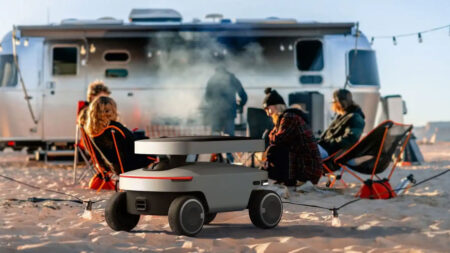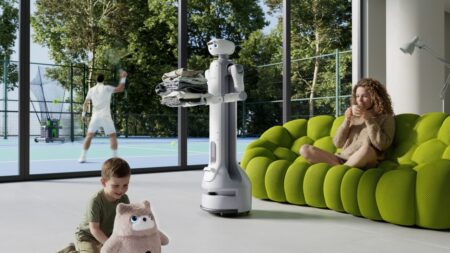As a tech lover, there is nothing that gets better than standing in front of a new gadget. Whether it is a fresh perspective on an already-known technology or a ground-breaking new concept, the experience is uplifting. Therefore, walking across thousands of stands and booths in Vegas, in the cold winter of January, is a yearly ritual for many of us.
It is at this ‘carnival of technology’ that every new innovation in consumer tech – that will make a change in the coming year – is showcased. It’s here that businesses network, policymakers talk, startups find investors, and journalists stroll the grounds for the next big tech story. There is something for everyone at the CES, and 2024 is going to be no different. In fact, this time, the event, scheduled from 9 through 12 January, is going to be bigger, better, and more AI-oriented than ever before. A record number of exhibitors and crowds are expected, and as journalists, we will be here, wondering to pick of the buzzwords or trends.
“We’ve already got 3500 exhibitors confirmed from every industry from mobility and healthcare and the automotive space to entertainment and beyond,” Steven Hummel, Senior Manager Market Research at Consumer Technology Association (CTA), which organizes the CES, tells Homecrux.
The Changing Exhibition
“There’s usually like one or two…buzzwords at CES every year. “Last year it was metaverse, and so the number of extended reality headsets, VR headsets, augmented reality headsets that came out was high,” Hummels said.
And then, things changed and evolved. This year, he predicts, the biggest “buzzword or trend or takeaway” will be AI: generative AI! “We expect a massive footprint of exhibitors to focus their attentions and their showing on general artificial intelligence, to be a part of their product ecosystems or a part of their underpinnings.”
The most pressing issues through the pandemic have curved down after hitting the pinnacle. The trend for digital healthcare however has seen little deviation, even when there has been a shift in trend in purchase of TVs, smart home speakers, and the gaming industry. “From my experience at CTA and at CES over the past few years, we’ve really seen a rise or really an explosion of players in the digital health space” Hummel recalls.
Digital Health Summit is scheduled at CES 2024 and this is a crux of the popularity of digital healthcare during the pandemic. Companies may have not reached the convention center to set up booths, but through virtual displays, we have seen the innovations, as COVID-19 fostered the growth of individuals taking ownership of their personal health and metrics and requiring gadgets to help with monitoring.
The digital health products that had been in the experimental and prototype stages in the last few years have now reached consumers. “Amron, Siemens,” and so many others that have been in the field in this industry for years have been leading the charge with various healthcare researches by the CTA playing a part in their outlook.

Hummel says, “Two years ago, a lot of it (digital healthcare products) was experimental. There were a lot of products on display, but we were in the kind of concept phase. Then last year we went well beyond proof of concept to commonplace measures for individuals to democratize their own health.”
Hummel, as the Sr. Manager Market Research at CTA, has a role to play in providing research-based information to businesses as much as they can to help them make smart decisions, and move in a certain direction of a trend, quickly. He informs that while CES is only a 3-day outing, “we do research over the course of the year on their behalf when we’re not doing the show.” We’re doing about 30 researches every year, including a smart home research this year which is surveying about 300 home builders to learn about the types of technologies they’re putting into new homes, “to get investors together with startups and make sure that, they’re making the best business decisions for themselves and to grow their industries.”
The CES 2024 Smart Home Trends

We are only a month away from CES. While a lot of what could be exhibited in Vegas remains “under wraps right now”, the drapes will begin falling soon and what the big players and startups are going to showcase will become clearer.
There is little doubt about the fact that the ingredient technology for most of what we are going to see will be AI. Home appliances will be the first to leverage the concept of AI and machine learning, allowing the idea of a smart home to scale up from voice commands and connected convenience to a “more predictive nature.” For a smart home, it could mean better “efficiencies and diagnostics.”
A product like a hot water heater, when it fails, can have a very drastic impact on your house in terms of safety and damages. With the AI, the device could have the ability to self-diagnose maybe, Hummel notes; so “when something’s not right with a heat pump or your HVAC system is not working properly. Using AI could certainly better help with that,” he elaborates.
The smart devices would be powered with more integration. Interoperability amid devices from different brands has remained in question since the inception of IoT. People have often found themselves crippled with tech, while trying to create a smart home, only to have products from different manufacturers unwilling to work in unison. The Matter standard has made all things smart home align together and there will be investments into such standards and the “space where consumers have less friction in terms of interoperability.”
Hummel suggests, “AI will probably trickle down into smart home products so that everything is working seamlessly together.” In order for everything to work seamlessly, better connectivity for all of the smart home products within the household is going to be of utmost importance. As companies aim for better speed and reliability, CES could see a shift in trend from Wi-Fi 6 standard to Wi-Fi 7. There were traces of the wireless standard last year and the Wi-Fi 7-based chips and routers are already out, but when will we be able to take full advantage of the new wireless standard is something we are going to have answers for at the CES.
There might be certainly more technological advances on the way, especially in terms of products from the tech giants. While the focus was on cosmetic appeal and customization last year, this year, Hummels says, “They’re certainly going to expand. This time, I think battery technologies will play a big role. We’ve got the lithium ions, but I think, graphene technology in batteries is going to be really important to just minimize the footprint in terms of weight and size of these batteries.”
Given the number of natural disasters we are facing, perhaps because of climate change, a “way to be able to power your house, or for it to be sustainable of off the grid, will be more of a theme. These new battery technologies will be able to keep a home powered without the risk of fires.”
The battery innovation will largely focus on longevity but this is not going to be just for the smart homes. On the side, this could simultaneously be a commitment to make the electric vehicles gain mileage and charge better. This will benefit “everything from EV charging stations to battery backups.”
Follow Homecrux on Google News!




